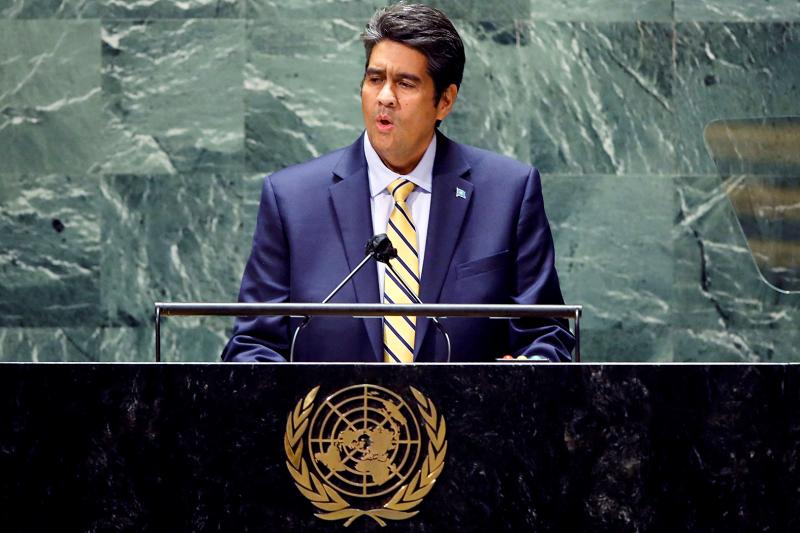Concerned about the potential effects of deep-sea mining on ocean biodiversity, the Pacific islands of Palau and Fiji on Monday launched an “alliance” to call for a moratorium of the nascent industry.
The backing of a moratorium comes amid a wave of global interest in deep-sea mining, but also growing pressure from some environmental groups and governments to either ban it or ensure it only goes ahead if appropriate regulations are in place.
Deep-sea mining uses heavy machinery to suck up off the ocean floor potato-sized rocks or nodules that contain cobalt, manganese and other metals mostly used in batteries.

Photo: Reuters
Speaking to a packed room at the UN Ocean Conference in Lisbon, Palauan President Surangel Whipps Jr asked: “How can we in our right minds say: ‘Let’s go mining’ without knowing what the risks are?”
“We believe it is not worth the risk,” Whipps said. “We ask all of you to support that ... deep-sea mining increases the vulnerability of the seabed floor and marine life.”
The UN’s International Seabed Authority (ISA) is drawing up regulations governing seabed mining in the high seas — areas outside any national jurisdiction. Until global rules are in place, seabed mining is not allowed.
The Deep Sea Conservation Coalition, which also supports a moratorium, said that the ISA would meet next month and in August to try to push through draft regulations that, if adopted, would see mining licensed to begin in the deep ocean as soon as July next year.
Earlier this month, Chile also called for a 15-year moratorium on adopting regulations, citing environmental concerns and a lack of sufficient scientific data.
Members of the G7 last month agreed stringent environmental controls should govern deep-sea mining and that they would consent to such mining projects only if they did not seriously harm the marine environment.
Not all nations are against it. China is a major proponent and even smaller nations such as Nauru, for instance, last year asked the ISA to fast-track the adoption of seabed mining regulations.
Companies such as Google, BMW and Samsung were the first globally to sign up to a WWF call for a moratorium on deep-sea mining.
“The costs outweigh the short-term benefits,” oceanographer Sylvia Earle said. “We need to hit the stop button.”

Shamans in Peru on Monday gathered for an annual New Year’s ritual where they made predictions for the year to come, including illness for US President Donald Trump and the downfall of Venezuelan President Nicolas Maduro. “The United States should prepare itself because Donald Trump will fall seriously ill,” Juan de Dios Garcia proclaimed as he gathered with other shamans on a beach in southern Lima, dressed in traditional Andean ponchos and headdresses, and sprinkling flowers on the sand. The shamans carried large posters of world leaders, over which they crossed swords and burned incense, some of which they stomped on. In this

The death of a former head of China’s one-child policy has been met not by tributes, but by castigation of the abandoned policy on social media this week. State media praised Peng Peiyun (彭珮雲), former head of China’s National Family Planning Commission from 1988 to 1998, as “an outstanding leader” in her work related to women and children. The reaction on Chinese social media to Peng’s death in Beijing on Sunday, just shy of her 96th birthday, was less positive. “Those children who were lost, naked, are waiting for you over there” in the afterlife, one person posted on China’s Sina Weibo platform. China’s

‘NO COUNTRY BUMPKIN’: The judge rejected arguments that former prime minister Najib Razak was an unwitting victim, saying Najib took steps to protect his position Imprisoned former Malaysian prime minister Najib Razak was yesterday convicted, following a corruption trial tied to multibillion-dollar looting of the 1Malaysia Development Berhad (1MDB) state investment fund. The nation’s high court found Najib, 72, guilty on four counts of abuse of power and 21 charges of money laundering related to more than US$700 million channeled into his personal bank accounts from the 1MDB fund. Najib denied any wrongdoing, and maintained the funds were a political donation from Saudi Arabia and that he had been misled by rogue financiers led by businessman Low Taek Jho. Low, thought to be the scandal’s mastermind, remains

Australian Prime Minister Anthony Albanese yesterday announced plans for a national bravery award to recognize civilians and first responders who confronted “the worst of evil” during an anti-Semitic terror attack that left 15 dead and has cast a heavy shadow over the nation’s holiday season. Albanese said he plans to establish a special honors system for those who placed themselves in harm’s way to help during the attack on a beachside Hanukkah celebration, like Ahmed al-Ahmed, a Syrian-Australian Muslim who disarmed one of the assailants before being wounded himself. Sajid Akram, who was killed by police during the Dec. 14 attack, and